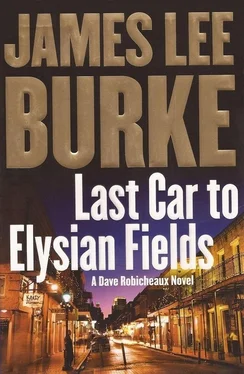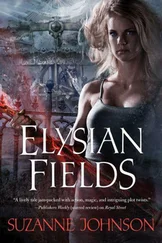The figure leaned over him, blotting out the sky. Leon tried to speak, but the only sound that issued from his body was the air wheezing through the hole in his lung.
Then his mouth was pried apart and something that was stiff and bittersweet and crusted with dirt was shoved between his teeth and forced deep into his throat. Leon’s right hand tried to clasp the shoe of the figure bending over him, to somehow telegraph the plea for mercy that his lungs and throat could not make. At that moment he looked into the face of his tormentor and knew what his final moments on earth would be like. He twisted his head sideways and looked desperately out at the highway, wondering how the world of normal people and normal events could be only a heartbeat away.
No one reported the shooting until just before sunrise, when a tramp who had been sleeping in the weeds by the railway track crossed the road and tripped over the body. Helen Soileau picked me up at my house in a cruiser and handed me a thermos filled with coffee and hot milk.
She hit the flasher and we rolled through town to the crime scene.
“You’re the skipper now. You don’t have to do this early A.M. stuff anymore,” I said.
“Somebody has to keep you guys on your leash,” she replied.
Her eyes looked straight ahead, her expression flat. We passed a long row of shacks, the reflection of the flasher rippling across the house fronts.
“This isn’t a robbery-homicide, is it?” I said.
Cane trucks packed to the top were already on the road when we got to the crime scene, snarling traffic at the intersection by the drawbridge. The early sun was red through the trees and mist was rising off the bayou behind the hospital. Leon Hebert lay on the oysters shells a few feet from his drive-by window, a bullet wound in his chest, a second one puckered in the center of his forehead, a third through the eye. A blue daiquiri cup had been compressed into a cone and stuck in his mouth.
An ambulance and three sheriff’s department vehicles were parked outside the yellow crime-scene tape that had been strung through the oak trees. The coroner had not arrived but our forensic chemist, Mack Bertrand, was kneeling beside the body, slipping plastic bags over the hands of the dead man. A small man in tattered clothes and tennis shoes without socks sat outside the tape his back against a tree trunk, his knees drawn up before him.
“How do you read it, Mack?” I said.
“The shooter used a revolver or he picked up his brass. I’d say the wounds were made with either a .38 or a nine-millimeter,” he replied.
He had ascetic features and wore a clip-on bow tie, suspenders, a crinkling white shirt, and a briar pipe in a little leather holster on his belt.
He lifted the dead man’s right wrist. “It looks like there’s shoe polish under his fingernails,” he said. “My guess is the first round was fired from a distance and hit him in the chest. Then the shooter walked up close and put the next two in him point-blank. The victim probably looked up into the shooter’s face and grabbed his shoe before he died.”
“Why would he do that?” Helen asked.
Mack shook his head. He popped open another plastic bag and with a pair of tweezers lifted the coned plastic cup from the dead man’s mouth, then dropped it inside the bag. “Take a look at this,” he said, getting to his feet. “There’s blood on the bottom of the cup. That means the victim’s heart was probably still pumping when the cup was shoved into his mouth.”
“Meaning?” Helen said.
“Who knows?” he said.
“No forced entry on the building?” I said.
“None that I could see,” he said.
“How about tire impressions?” Helen asked.
“Probably every kind of tire made in the western world has been through here. Did y’all know this guy?” Mack said.
“He moved back here from L.A. He used to sell burial insurance,” Helen said.
I looked at the small man in tattered clothes sitting against the tree trunk outside the tape “Is that the guy who found the victim?”
“Yeah, good luck. I get the impression he’s a traveling wine connoisseur,” Mack said.
I stepped outside the crime-scene tape and squatted down eye-level with the man in tattered clothes. His skin was grimed with dirt and he wore a greasy cap crimped down on his head. Like all men of his kind, his origins, the people who had conceived him, the place or home where he grew up had probably long ago ceased being of any importance to him.
“You were sleeping by the tracks?” I said.
“I fell off the train. I was pretty much knocked out,” he said.
“Did you see or hear anything that might be helpful to us?” I asked.
“I told it to that other guy.” He nodded toward Mack Bertrand.
“Nothing bad is going to happen to you, podna. You’re not going to jail. We’re not holding you as a material witness. All those things are off the table Just tell me what you saw.”
He wiped his nose with his wrist. “Late last night I heard something go ‘pop.” Then I heard it again. Maybe twice. Then a pickup truck drove off.”
“Did you see the driver?”
“No.”
“What did the pickup truck look like?”
“Just a truck. It was going down toward the bridge there.”
“Why’d you come across the road this morning?”
“They got free coffee at the hospital,” he replied.
My knees ached when I stood up. I took two dollars from my wallet and gave it to him. “There’s a donut shop back toward town. Why don’t you get yourself something to eat?” I said. I started to walk away from him.
“I seen something go flying out the truck window. Under the streetlight. Down toward the drawbridge. I don’t know if that’s any help to you or not,” he said.
A few minutes later the coroner arrived. Later, the paramedics unzipped a black body bag and placed the remains of Leon Hebert inside it and lifted it onto a gurney. Mack Bertrand fiddled with his pipe and put it between his teeth, upside down. He was a family man, a Little League coach and regular churchgoer and usually not given to a public expression of sentiment.
“You asked why the victim grabbed the shooter’s shoe,” he said. “He was asking for mercy.”
I waited for him to continue. But he didn’t.
“Go on, Mack,” Helen said.
“That’s all. He had a sucking chest wound and couldn’t speak. It was probably like drowning while somebody watched. So he tried to beg with his hand. He must have been a bad judge of character.”
“How’s that?” I asked.
“Whoever did this poor bastard wanted him to go out as hard as possible,” Mack said.
Helen and I and a uniformed deputy searched along the edges of the road by the drawbridge, looking for the object the hobo said he had seen thrown from the fleeing pickup truck. But we found nothing of consequence. Helen dropped me at my house and I shaved and showered and drove to the office. At 9:15 A.M. I called the office of Dr. Parks. The receptionist said he would not be in. I called his home.
“What do you want, Mr. Robicheaux?” he said.
“How did you know it was—”
“Caller ID. What’s the problem now?”
“I’d like to come out to your house a few minutes.”
“You’re not welcome at my house.”
“Sorry to hear you say that,” I replied.
I drove up Loreauville Road, through horse-farm country and fields bursting with mature sugarcane, under a hard blue sky you could have scratched with a nail. The air was cool and sweet smelling, like cinnamon burned on a woodstove, and through the cypress and oak trees that lined the Teche the sunlight glittered like goldleaf on the water’s surface.
But when I turned into Dr. Parks’s driveway I seemed to enter a separate reality. His house was covered with shadow, the air cold, the birdbaths and empty fishpond and flagstone walkways moss stained and smelling of night-damp. The back end of a battered beige pickup truck stuck out of a shed in the rear of the house. Next to it was a stack of hay bales with a plastic bull’s-eye pinned to them and a dozen arrows embedded in the straw. I had to ring the bell twice before he answered the door.
Читать дальше












